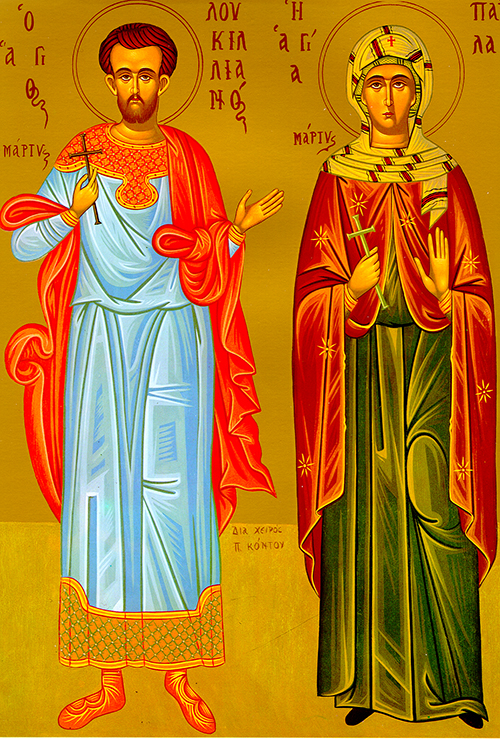

The holy martyr Lucillian was a pagan priest during the reign of the Roman emperor Aurelian (270-275). In his old age he was persuaded to see the falseness of the pagan religion, and with all his heart he turned to the faith in Christ the Savior and was baptized. Under the influence of his preachings, many pagans were converted to Christianity. Then certain Jews, seeing that he was spreading faith in Christ, reported the saint to the Nicomedia prefect, who urged the old man to return to idol worship. When St. Lucillian refused, they smashed his jawbone and beat him with rods and suspended him upside down, and then they locked him in prison. There he met four youths who were confessors of Christianity: Claudius, Hypatius, Paul, and Dionysius. They were brought to trial, and thrown into a red-hot furnace. Suddenly, rain fell and extinguished the flames, and the martyrs remained unharmed. The governor sentenced them to death, sending them to Byzantium to be executed. The holy youths were beheaded by sword, and the holy martyr Lucillian was nailed to a cross with many nails.
Troparion
O Lord our God, your holy martyrs have deserved the crown of immortality on account of their good fight. Armed with your strength they have vanquished their persecutors and crushed Satan’s dreadful might. Through their supplications, O Christ our God, save our souls.
Kontakion
You approached the fire but were not burned, O courageous and wise martyr Lucillian. You possessed the cooling dew of God. You and your companions surpassed nature; therefore, we ask all of you to remember us.
Epistle
Romans 7: 1-13
Brothers and sisters: Are you not aware (I am speaking to men who know what law is), that the law has power over a man only so long as he lives? For example, a married woman is bound to her husband by law while he lives, but if he dies she is released from the law regarding husbands. She will be called an adulteress if, while her husband is still alive, she gives herself to another. But if her husband dies she is freed from that law, and does not commit adultery by consorting with another man. In the same way, my brothers, you died to the law through the body of Christ, that you might belong to that Other who was raised from the dead, so that we might bear fruit for God. When we were in the flesh, the sinful passions roused by the law worked in our members and we bore fruit for death. Now we have been released from the law – for we have died to what bound us – and we serve in the new spirit, not the antiquated letter.
What follows from what I have said? That the law is same as sin? Certainly not! Yet it was only through the law that I came to know sin. I should never have known what evil desire was unless the law had said, “You shall not covet.” Sin seized that opportunity; it used the commandment to rouse in me every kind of evil desire. Without law sin is dead, and at first I lived without law. Then the commandment came; with it sin came to life, and I died. The commandment that should have led to life brought me death. Sin found its opportunity and used the commandment: first to deceive me, then to kill me. Yet the law is holy and the commandment is holy and just and good.
Did this good thing then become death for me? Not that either! Rather, sin, in order to be seen clearly as sin, used what was good to bring about my death. It did so that, by misusing the commandment, sin might go to the limit of sinfulness.
Gospel
Matthew 9:38 – 10:8
When Jesus saw the crowds, his heart was moved with pity. They were lying prostrate from exhaustion, like sheep without a shepherd. He said to his disciples: “The harvest is good but laborers are scarce. Beg the harvest master to send out laborers to gather his harvest.”
Then he summoned his twelve disciples and gave them authority to expel unclean spirits and to cure sickness and disease of every kind.
The names of the twelve apostles are these: first Simon, now known as Peter, and his brother Andrew; James, Zebedee’s son, and his brother John; Phillip and Bartholomew, Thomas and Matthew the tax collector; James, the son of Alphaeus, and Thaddeus; Simon the Zealot Party member, and Judas Iscariot, who betrayed the Lord. Jesus sent these men on mission as the Twelve, after giving them the following instructions:
“Do not visit pagan territory and do not enter a Samaritan town. Go instead after the lost sheep of Israel. As you go, make this announcement: ‘The reign of God is at hand!’ Cure the sick, raise the dead, heal the leprous, expel demons. The gift you have received, give as a gift.”
Icon courtesy of Jack Figel, Eastern Christian Publications – ecpubs.com
Sunday, June 2 –